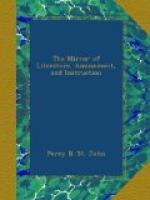Here she rais’d her eyes, to the
once bright skies,
For she heard the deep sea
groan,
And her song it stopp’d, and her
hands they drop’d,
Her face grew white as the
foam;
For the lovely blue, was hid from her
view,
By a black and mighty cloud!
She saw in each wave, a watery grave,
And again she sang aloud:
“But the
clouds are rolling heavy,
Fitful gusts distend
his sail;
See the whirlpool’s
foaming eddy,
Hear the seagull’s
mournful wail.
“Now his
vessel greets the thunder,
Now she rests
on ocean’s bed,
Where in shrines
of pearl and amber,
Youthful lovers,
love, though dead.
“Gracious
Heaven! in mercy spare him,
Shield him with
thine arm of pow’r;
On thy wings,
oh! Father, bear him
Through this dark
and troubled hour.
“In yon
convent then to-morrow
Will I give to
thee my days;
Flee this world
of grief and sorrow,
Endless sing thee
hymns of praise.
“But if
thou hast bid us sever,
Till we reach
the heavenly shore,
I will steer my
bark, where never,
Waves nor death
shall part us more.
“We will
roam the plains of ocean,
Tread the sands
where rubies shine,
Drink from starry
founts the potion
Mortals taste,
and grow divine.
“But his
vessel’s sinking slowly,
And mine hour
of death is near;
Yet I shrink not,—sweet
and holy
Is the end that
knows no fear.”
Scarce the words had died, and the crimson
tide,
Flow’d calm in her heaving
breast,
When she flew to the wave, to share his
grave,
And taste of his final rest.
And the fishermen boast, who dwell on
that coast,
That after the ev’ning
bell
Has toll’d the hour, in sleet and
in shower,
They float on a golden shell.
And all night they roam, where the breakers
foam,
When the moonbeams streak
the waves,
But when morn awakes and the twilight
breaks,
They glide to their coral
caves.
Leeds.
T.W.H.
* * * * *
Manners and Customs.
EARLY INHABITANTS OF BRITAIN.
(To the Editor.)
In your Correspondent Selim’s laudable endeavour to vindicate the ancient inhabitants of this island from the character of barbarians given them by Caesar, he has made some errors, which, with your permission, I will attempt to rectify. First, I beg leave to dissent from the derivation of the word Druid, “Druidh,” a wise man, as such a word is not to be found in the Welsh language. In one of your early volumes[5] there is a letter from a Correspondent, deriving the word (in the above language it is written Derwydd) from Dar and Gwydd,




